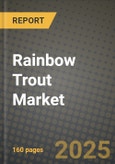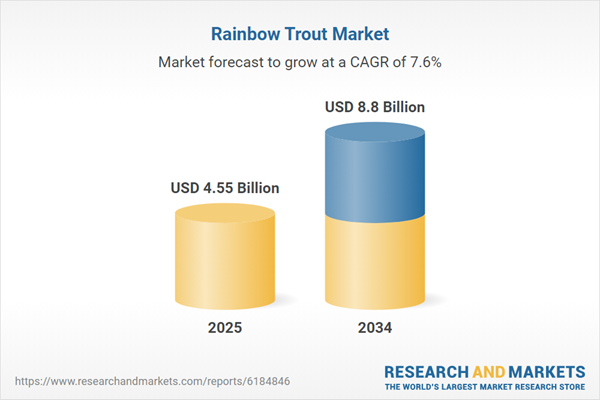Rainbow Trout Market
Rainbow trout is one of the world’s most established cold-water aquaculture species, produced across freshwater raceways, ponds, flow-through systems, net-pens in lakes/fiords, and increasingly recirculating aquaculture systems (RAS). Core end-uses span chilled and frozen fillets, whole fish, smoked and marinated products, sashimi/ready-to-eat formats, and value-added convenience packs for retail, foodservice, and e-commerce. Recent trends center on sustainability certification, antibiotic-sparing health protocols, low-carbon farming (energy-efficient aeration, oxygenation, and sludge valorization), and traceability to verify origin and welfare. Genetics programs (triploid/sterile stocks, improved growth/FCR) and advanced feeds (functional additives, insect/algae/single-cell proteins) support resilience and brandable ESG stories. Demand is buoyed by the species’ mild flavor, high protein/omega profile, reliable year-round supply, and competitive pricing versus premium finfish. Growth drivers include retail premiumization, smoked/ready-to-cook innovation, chefs’ preference for versatile white-pink flesh, and modern cold-chain in emerging markets. Headwinds revolve around climate variability (temperature spikes, low dissolved oxygen), biosecurity risks, water-use scrutiny, and community expectations around effluents and benthic impact. Competitive dynamics feature a mix of vertically integrated producers, regional cooperatives, specialized hatcheries, feed majors, RAS technology vendors, and logistics/processing partners; scale advantages accrue to players with secure water rights, multi-site footprints, biosecure broodstock, and branded value-added portfolios. As retailers tighten sustainability scorecards and restaurants seek consistent specification, procurement is migrating toward certified, traceable, and welfare-audited trout with stable fillet yields. The market is steadily shifting from commodity whole fish toward portion-controlled, MAP/skin-vacuum packaged fillets and smoked products supported by digital provenance and retailer collaborations.Rainbow Trout Market Key Insights
- Sustainability and certification pull-through: Retail and foodservice increasingly require third-party certifications and welfare audits. Producers that combine effluent management, low-carbon energy, and transparent reporting secure preferred-supplier status and longer contracts, reinforcing price realization and shelf placement.
- Health and biosecurity modernization: Vaccination, functional feeds, and robust hatchery protocols reduce morbidity and harvest variability. Farm designs incorporate fallowing, single-year-class stocking, barrier nets, and rapid diagnostics that shrink downtime and enhance customer fill rates during seasonal peaks.
- Genetics and broodstock control: Selective breeding for growth, fillet yield, and resistance traits, plus widespread use of triploids for containment, improves biological performance and regulatory acceptance. In-house or allied broodstock access cushions producers against egg supply shocks and specification drift.
- Feed innovation and ingredient substitution: Alternative proteins (insect, algal, single-cell) and oil upgrades support sustainability narratives while stabilizing formulation costs. Functional additives improve gut health and stress tolerance, maintaining uniformity that processors and retailers prize.
- System choices: flow-through vs. RAS vs. net-pens: Flow-through remains cost-efficient where water is abundant and regulated; net-pens enable scale with careful site selection; RAS provides proximity to consumption centers, biosecurity, and year-round harvests. Multi-system portfolios hedge environmental and policy risk.
- Value-added and brand architecture: Shift from whole fish to trimmed fillets, smoked slices, and chef-ready cuts expands margins and reduces waste. Branding around local water, welfare, and freshness - supported by QR-based provenance - improves differentiation in crowded seafood sets.
- Cold-chain and packaging advancements: MAP and skin-vacuum packs extend shelf life and enable e-commerce fulfillment with lower returns. Standardized specs and retail-ready cases shorten planogram resets and stabilize weekly promotions without quality complaints.
- Regulatory and water stewardship: Water rights, discharge permits, and nutrient caps drive investment in filtration, sludge capture, and circular by-product uses. Operators that exceed compliance with transparent monitoring build durable community licenses to operate.
- Market access and channel mix: Supermarkets and club stores absorb consistent volumes, while restaurants and sushi formats deliver premium cuts and smoked variants. E-commerce and Q-commerce add incremental reach in urban centers with reliable last-mile cold logistics.
- Risk management and diversification: Multi-site geographies, staggered cohorts, and insurance/hedging reduce biological and weather exposure. Strategic alliances with feed, processing, and distribution partners secure inputs, throughput, and end-market continuity.
Rainbow Trout Market Reginal Analysis
North America
Demand is anchored by retail fillets, smoked specialties, and restaurant adoption of sustainable, mild-flavored fish. Producers emphasize RAS near major metros and improved raceway biosecurity to manage temperature stress. Buyers prioritize certified supply, consistent fillet yields, and MAP/skin-vacuum packaging for e-commerce. Partnerships with regional processors and club stores stabilize throughput and promotional calendars.Europe
A mature, quality-driven market with strong certification norms and exacting welfare expectations. Lake/fiord net-pens and high-standard flow-through sites serve retail private labels and premium smoked categories. Energy efficiency, effluent control, and circular sludge management are procurement differentiators. Foodservice favors portion-controlled fillets and chef-ready cuts with reliable year-round specs.Asia-Pacific
Fast-growing consumption supported by expanding cold chains and culinary adoption in Japan, Korea, China, and Southeast Asia. Hybrid production - coastal net-pens, inland flow-through, and urban-adjacent RAS - improves supply security. Retailers increasingly feature branded trout as an accessible alternative to premium species, while foodservice leverages sashimi-grade formats and smoked lines.Middle East & Africa
Import-reliant markets value stable, high-spec chilled and frozen fillets with strong provenance. Water-scarcity and temperature constraints spur interest in RAS and energy-efficient oxygenation. Retail and hospitality channels prioritize consistent sizing and extended shelf life; government initiatives to improve food self-sufficiency support pilot aquaculture projects.South & Central America
Trout production in Andean highlands underpins regional availability, with growing processed and smoked exports. Investments target hatchery biosecurity, cold-chain upgrades, and packaging suited for long-haul logistics. Retail private labels and tourism-driven foodservice demand standardized cuts, while certification and community engagement enhance access to premium buyers.Rainbow Trout Market Segmentation
By Type
- Small
- Medium
- Large
By Farming
- Aqua Culture
- Wild Culture
By Packaging
- MAP
- Vacuum
- Others
By Product
- Fresh
- Canned
- Frozen
By Sales Channel
- Hypermarkets and Supermarkets
- Convenience Stores and Independent Retailers
- Specialty Stores
- Online
Key Market players
Clear Springs Foods, Inc., Truiten LLC, Grieg Seafood ASA, Cermaq Group AS, Mowi ASA, Lerøy Seafood Group, Dawnfresh Farming Ltd, Hunan Zhangjiajie Tongxi Aquatic Product Co. Ltd, Blue Ridge Aquaculture, Zumaque Aquaculture, Skretting (Nutreco), Kona Coast Shellfish, Ranger Trout Farm, Riverence Holdings LLC, SOVI Fish FarmRainbow Trout Market Analytics
The report employs rigorous tools, including Porter’s Five Forces, value chain mapping, and scenario-based modelling, to assess supply-demand dynamics. Cross-sector influences from parent, derived, and substitute markets are evaluated to identify risks and opportunities. Trade and pricing analytics provide an up-to-date view of international flows, including leading exporters, importers, and regional price trends.Macroeconomic indicators, policy frameworks such as carbon pricing and energy security strategies, and evolving consumer behaviour are considered in forecasting scenarios. Recent deal flows, partnerships, and technology innovations are incorporated to assess their impact on future market performance.
Rainbow Trout Market Competitive Intelligence
The competitive landscape is mapped through proprietary frameworks, profiling leading companies with details on business models, product portfolios, financial performance, and strategic initiatives. Key developments such as mergers & acquisitions, technology collaborations, investment inflows, and regional expansions are analyzed for their competitive impact. The report also identifies emerging players and innovative startups contributing to market disruption.Regional insights highlight the most promising investment destinations, regulatory landscapes, and evolving partnerships across energy and industrial corridors.
Countries Covered
- North America - Rainbow Trout market data and outlook to 2034
- United States
- Canada
- Mexico
- Europe - Rainbow Trout market data and outlook to 2034
- Germany
- United Kingdom
- France
- Italy
- Spain
- BeNeLux
- Russia
- Sweden
- Asia-Pacific - Rainbow Trout market data and outlook to 2034
- China
- Japan
- India
- South Korea
- Australia
- Indonesia
- Malaysia
- Vietnam
- Middle East and Africa - Rainbow Trout market data and outlook to 2034
- Saudi Arabia
- South Africa
- Iran
- UAE
- Egypt
- South and Central America - Rainbow Trout market data and outlook to 2034
- Brazil
- Argentina
- Chile
- Peru
Research Methodology
This study combines primary inputs from industry experts across the Rainbow Trout value chain with secondary data from associations, government publications, trade databases, and company disclosures. Proprietary modeling techniques, including data triangulation, statistical correlation, and scenario planning, are applied to deliver reliable market sizing and forecasting.Key Questions Addressed
- What is the current and forecast market size of the Rainbow Trout industry at global, regional, and country levels?
- Which types, applications, and technologies present the highest growth potential?
- How are supply chains adapting to geopolitical and economic shocks?
- What role do policy frameworks, trade flows, and sustainability targets play in shaping demand?
- Who are the leading players, and how are their strategies evolving in the face of global uncertainty?
- Which regional “hotspots” and customer segments will outpace the market, and what go-to-market and partnership models best support entry and expansion?
- Where are the most investable opportunities - across technology roadmaps, sustainability-linked innovation, and M&A - and what is the best segment to invest over the next 3-5 years?
Your Key Takeaways from the Rainbow Trout Market Report
- Global Rainbow Trout market size and growth projections (CAGR), 2024-2034
- Impact of Russia-Ukraine, Israel-Palestine, and Hamas conflicts on Rainbow Trout trade, costs, and supply chains
- Rainbow Trout market size, share, and outlook across 5 regions and 27 countries, 2023-2034
- Rainbow Trout market size, CAGR, and market share of key products, applications, and end-user verticals, 2023-2034
- Short- and long-term Rainbow Trout market trends, drivers, restraints, and opportunities
- Porter’s Five Forces analysis, technological developments, and Rainbow Trout supply chain analysis
- Rainbow Trout trade analysis, Rainbow Trout market price analysis, and Rainbow Trout supply/demand dynamics
- Profiles of 5 leading companies - overview, key strategies, financials, and products
- Latest Rainbow Trout market news and developments
Additional Support
With the purchase of this report, you will receive:- An updated PDF report and an MS Excel data workbook containing all market tables and figures for easy analysis.
- 7-day post-sale analyst support for clarifications and in-scope supplementary data, ensuring the deliverable aligns precisely with your requirements.
- Complimentary report update to incorporate the latest available data and the impact of recent market developments.
This product will be delivered within 1-3 business days.
Table of Contents
Companies Mentioned
- Clear Springs Foods Inc.
- Truiten LLC
- Grieg Seafood ASA
- Cermaq Group AS
- Mowi ASA
- Lerøy Seafood Group
- Dawnfresh Farming Ltd.
- Hunan Zhangjiajie Tongxi Aquatic Product Co. Ltd.
- Blue Ridge Aquaculture
- Zumaque Aquaculture
- Skretting (Nutreco)
- Kona Coast Shellfish
- Ranger Trout Farm
- Riverence Holdings LLC
- SOVI Fish Farm
Table Information
| Report Attribute | Details |
|---|---|
| No. of Pages | 160 |
| Published | November 2025 |
| Forecast Period | 2025 - 2034 |
| Estimated Market Value ( USD | $ 4.55 Billion |
| Forecasted Market Value ( USD | $ 8.8 Billion |
| Compound Annual Growth Rate | 7.6% |
| Regions Covered | Global |
| No. of Companies Mentioned | 15 |









